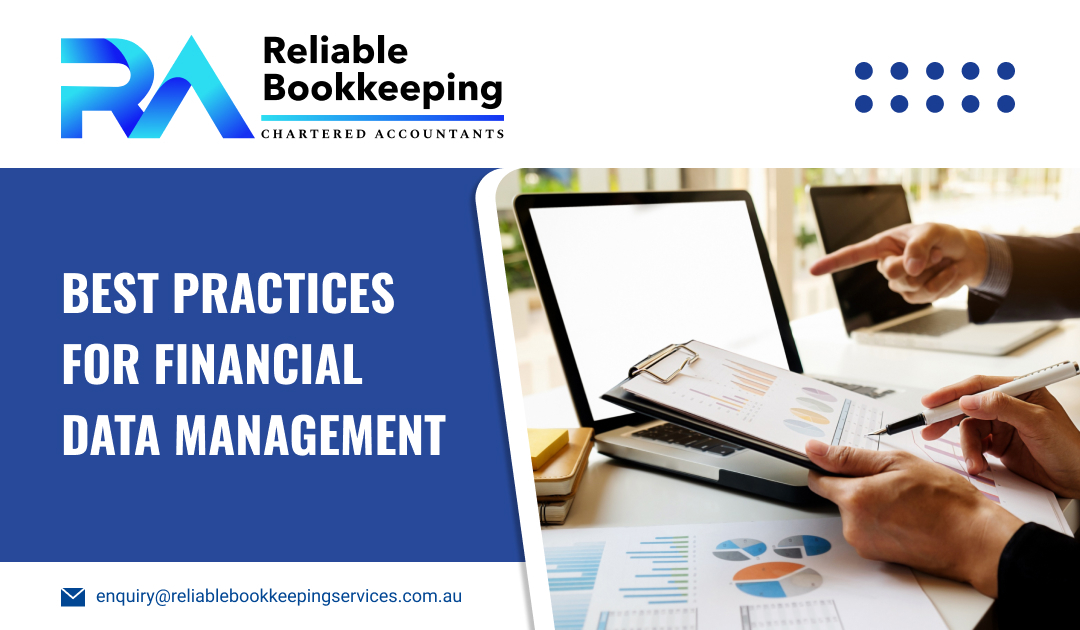Financial data typically expands with each passing quarter, and its management becomes a crucial part of every business. Since all financial records must be maintained for up to five years, it is essential to keep this information safe. It must also be saved from alterations, breaches, and manipulations to preserve data privacy and compliance. With cyber attacks increasing day by day and managing financial records becoming complex, it is essential to perform financial data management efficiently.
Past data is required by the business to make the right business decisions related to inventory management and budgeting. Financial data analysis allows businesses to improve their efficiency by spotting weaknesses and strengths that can be used to maximise revenue and profitability. Making the right business decision minimises the risk of losses and failure. In this blog post, we’ll discuss how a bookkeeper for small business can perform efficient financial data management to maintain efficiency and accuracy.
How to Perform Financial Data Management?
Financial data management refers to how businesses record, handle, organise, and protect their financial data. This data is crucial for decision-making, future planning, and compliance for any company. Proper financial management ensures that financial records are secure, accurate, and can be accessed whenever required. Here is how bookkeepers can help you with financial data management:
Create a data management strategy
Financial data management is an ongoing activity that must follow a specified framework. Businesses use the services of an expert bookkeeper to create a data management strategy. It ensures the business gathers information from reliable sources and stores it in the systems to be accessed by authorised users. Bookkeepers also set guidelines for using information and maintaining the quality of the data to ensure consistency. The strategy helps the accountants to understand their roles. It helps to standardise data collection, processing, analysis, and management. By accessing bookkeeping in Melbourne for your business, bookkeepers will ensure that the gathered data matches your business’s needs. It allows data governance depending on the established guidelines.
Comply with regulations
Reliable and professional bookkeepers ensure that the company’s financial data is stored according to the Australian Accounting Standards and International Reporting Standards. They follow federal and state regulations and submit reports on time to the Australian Taxation Office (ATO). Bookkeepers use accounting software to produce all the financial reports according to the reporting requirements specific to their type and size. Most businesses must retain these financial records for at least five years. In some cases, they may have to keep these records for up to seven years.
Process and analyse financial data
Data analysis is an essential aspect of every business due to the increasing amount of digital information available to the organisation. They need to save large amounts of financial data for decision-making and compliance purposes. It needs processing and analysing datasets to address patterns that can help the business grow with enhanced performance. Many bookkeepers use accounting software for accurate budgeting, cash flow forecasting, payroll processing, and inventory management. Bookkeepers also help tax accountants at the time of tax season by providing them with accurate financial records. For tax matters, ensure to hire someone with experience and knowledge, and you can also search for ‘best tax accountant near me’ to hire an accountant near your area.
Data auditing for improvements
Data auditing is crucial for data management because it helps ensure the accuracy and consistency of data. It monitors the authenticity of sources, manages stakeholder access, and ensures compliance with internal policies. It includes bank account reconciliation to ensure the integrity of financial reports. Data audits are also crucial for spotting mistakes and resolving them to maintain error-free and consistent information. The financial information needs to be transformed into charts and graphs for clear insights that offer clear communication. Accurate information can be used for analysing performance against benchmarks for tracking and improvement. Bookkeepers maintain data governance policies to follow industry best practices.
Conclusion
Efficient financial data management is crucial for companies to ensure data security, compliance, informed business decisions, operational efficiency, and reduced risk. These improvements improve stakeholder engagement, customer satisfaction, and employee productivity. With reliable bookkeeping services, you can expect to have accurate financial records of your company.

